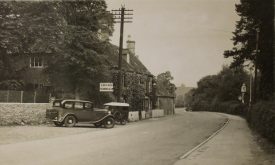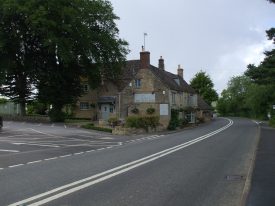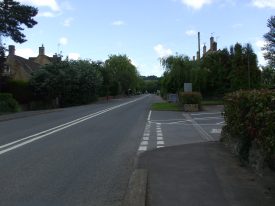On Christmas Eve 1998, I took delivery of a large brown envelope postmarked Southport. Inside was a copy of the death certificate of my great-great grandmother Ann Tennant. I knew that she had been buried in Long Compton churchyard aged 79. However I was completely unprepared for the cause of death as stated on the certificate:
At Long Compton on 15th September 1875, Ann Tennant, aged 79, wife of John Tennant, Labourer – Wilful Murder – Deliberately stabbed to death by James [Hayward] with a fork under a delusion of witchcraft.
I went straight to the British Library Newspapers Library and spent a whole day checking and photocopying the reports of the murder, the Inquest and the subsequent trial in six local newspapers. The headline in the Stratford upon Avon Herald dated 24th September 1875 read:
‘Brutal Murder at Long Compton’
The report goes on:
On the night in question, between seven and eight o’clock, the poor old woman left her cottage for the purpose of going to a small shop in the village for a loaf of bread. On her return she met Hayward, who had just left his work in the harvest fields and who, without a word on either side, attacked Mrs Tennant with a fork which he was carrying, inflicting such injuries upon her head and body that she died in the course of three hours. In fact, had it not been for the assistance of Mr John Taylor, a farmer, who resided near where the attack took place, he would have killed her on the spot. The only reason that can be assigned for the murder is that Hayward, for some time past, had been under the impression that he was influenced by witchcraft and that Mrs Tennant and several other women in Long Compton were witches, and he was determined to rid the village of them.
The inquest
An Inquest was held on Friday 17th at the Red Lion Inn, Long Compton. Many of the witnesses remarked that Mr. Hayward had ‘delusions about witches’ and threatened to kill 15 or 16 of them. Interestingly, it was not only women who were threatened: John Ivens reports that his grandfather was named by Mr. Hayward. One of the more poignant witness statements came from the daughter of the deceased, Elizabeth Hughes. She states ‘I heard my mother scream twice. I made up to where I heard the scream and saw Mr. Taylor who said “Pick up your mother.” She was lying on the ground bleeding and insensible.’
In the cells, the Superintendent of Police informed the defendant of Ann’s death: “I think it my duty to tell you that Mrs Tennant is dead and that you will be charged with murder.” He said, “Dead?” I answered, “Yes.” He said, “Well, I didn’t kill her outright.”
The jury at the inquest returned a verdict of wilful murder, ‘leaving his state of mind to be inquired into at the Assizes.’ Apparently, ‘a strong feeling appeared to be felt against the prisoner by many persons who had assembled in the village, and he was frequently hooted at’.










Comments
Loved reading about this. What a sad story, but the events of yesteryear are extremely interesting. Thank you for sharing this.
Thank you for sharing this. Ann was my 4th great grandmother and to be able to find this story has been wonderful.
Ann Tennant is my great Great-Great Grandmother also? Can you tell me if she is buried in Long Compton church? Thanks, Juliet
Add a comment about this page